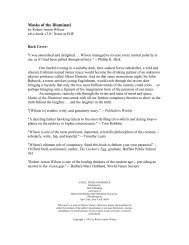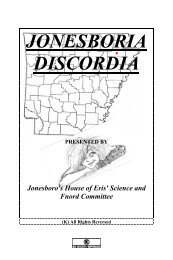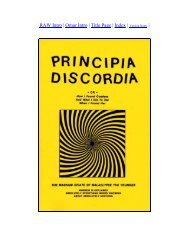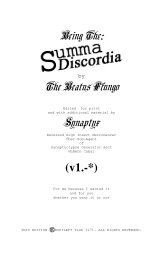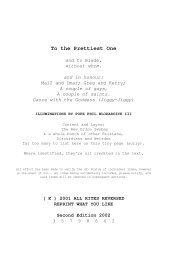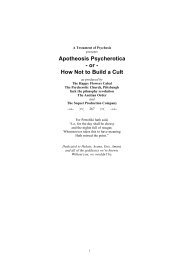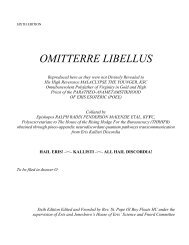Coincidance - Principia Discordia
Coincidance - Principia Discordia
Coincidance - Principia Discordia
You also want an ePaper? Increase the reach of your titles
YUMPU automatically turns print PDFs into web optimized ePapers that Google loves.
C01NC1DANCE<br />
Whether Homer was a feminist, a male chauvinist or a woman himself<br />
(herself?), he (she?) has all the qualities found in recent male poets, who are<br />
notoriously antigovernment, antiwar, antiauthority and fond of women<br />
children, nature and sexuality. Obviously, he was in Freudian terms an oral<br />
personality. In any case, his values (and those of later poets like Euripides,<br />
Sophocles, the anonymous authors of the Greek Anthology, etc.) were always<br />
compatible with sexual love, however much the relationship between men<br />
and women had been rendered problematical by the patriarchal system,<br />
which had reduced women to second-class citizens.<br />
With the coming of Christianity, this last vestige of the old matrist system<br />
crumbled. Women became less than second-class citizens: They became outcasts,<br />
pariahs, tools of Satan to be feared and dis'rusted. Their breasts became,<br />
not a proof that the high gods loved the world and deliberately graced it with<br />
beauty, but a sly trap designed by Satan to lure men into fleshly sin. Women<br />
were "sacks of dung," according to Origen: they deserved to be treated like<br />
untrustworthy slaves, Augustine reasoned, because it was a woman, Eve, who<br />
had brought evil into the world; they were inclined to fornicate with devils,<br />
according to Sprenger the Inquisitor, because their lusts were too extreme to<br />
be satisfied by mortal men. If they were not all witches, the Fathers agreed<br />
solemnly, they certainly needed a lot of careful watching.<br />
Considering that the current women's lib writers largely share the<br />
antisexual bias of the church fathers, it is curious that they haven't yet<br />
revived Augustine's celebrated argument that sexual feeling is itself a curse<br />
imposed upon us as punishment for the sin of Adam and Eve. According to<br />
the bishop's curious reasoning, Adam and Eve, before the Fall, had no sexual<br />
feelings at all, and this is the way God intended us to be. To the question,<br />
how did they manage to reproduce without sensation, Augustine gave an<br />
answer that is worthy of the consideration of ladies like Ti-Grace Atkinson:<br />
The organs of generation, he says, moved by "Will Power." His defense of<br />
this assertion, probably the most influential flight of reasoning in the whole<br />
history of Christian theology, is worth reproducing:<br />
There are persons who can move their ears, either one at a time, or both<br />
together. There are some who, without moving the head, can bring the<br />
hair down upon their forehead, and move the whole scalp backwards and<br />
forewards at pleasure. Some, by lightly pressing their stomach, bring up an<br />
incredible quantity and variety of things they have swallowed, and produce<br />
whatever they please, quite whole, as if out of a bag. Some so accurately<br />
mimic the voices of birds and beasts and other men that, unless they are<br />
seen, the differences canot be told. Some have such command of their<br />
bowels that they can break wind continuously at pleasure, so as to produce<br />
the effect of singing.*<br />
*St. Augustine, The City of God (New York: Modern Library, 1950)<br />
47




